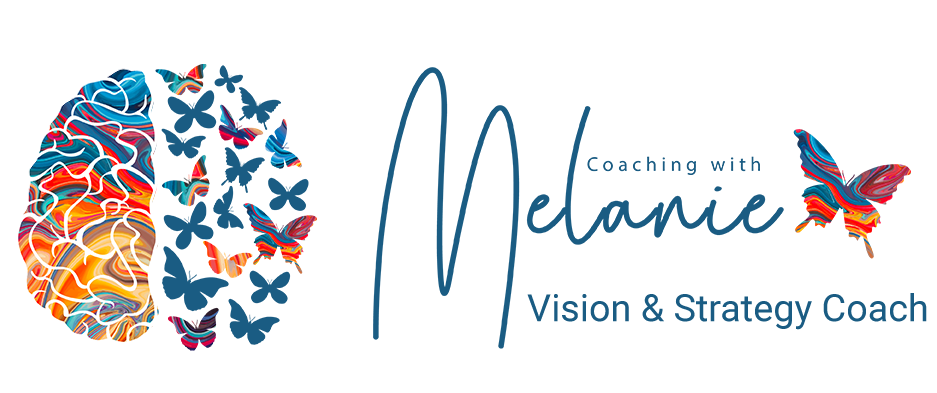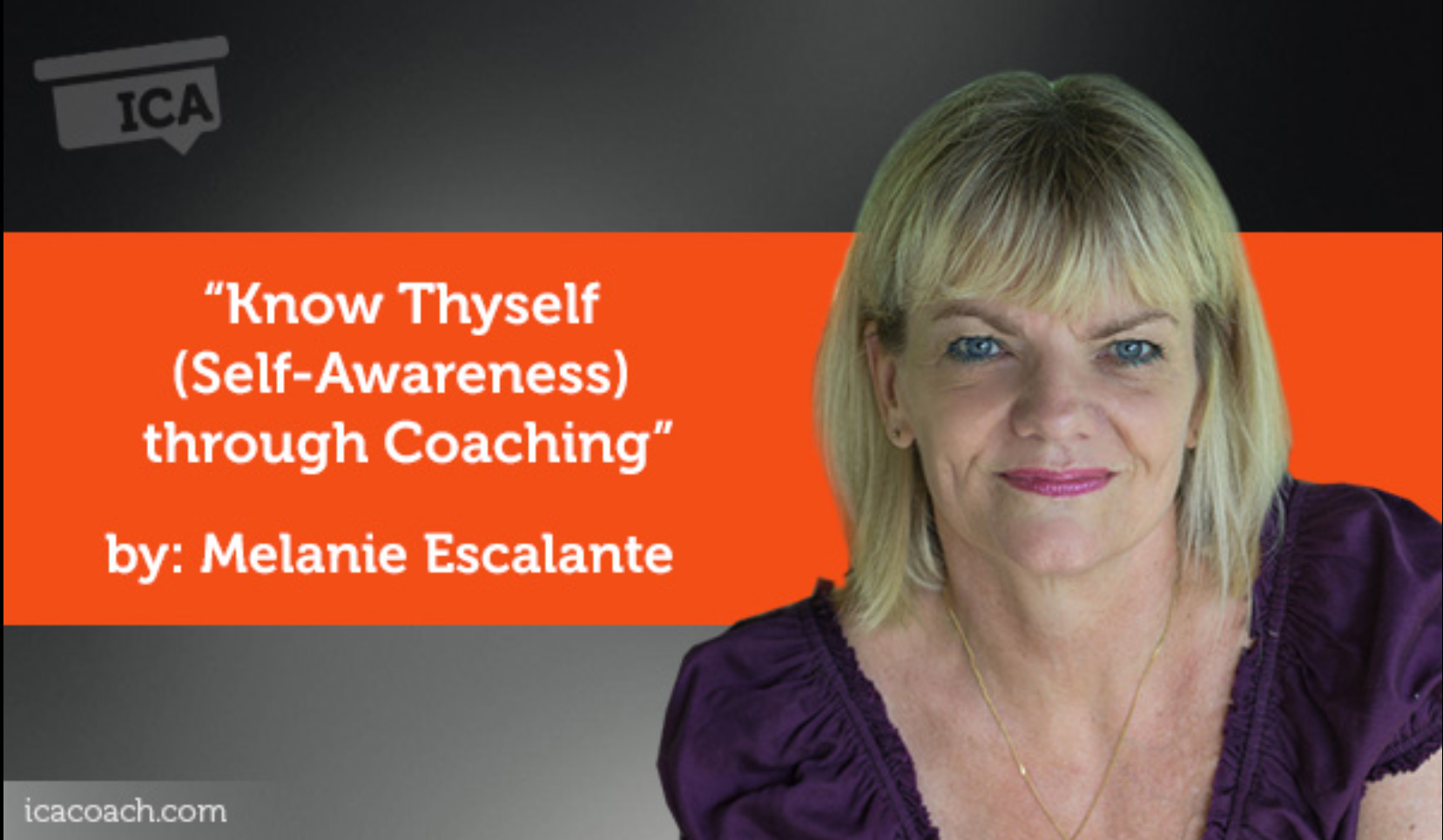This is an excerpt from my Research Paper (a course outcome for certification through the International Coach Academy) posted in full here: https://coachcampus.com/coach-portfolios/research-papers/melanie-escalante-know-thyself-self-awareness-through-coaching/
What is Self-Awareness?
The ICA Creating Awareness Module indicates, “awareness is having an inward focus, not an outward focus. Awareness is knowing the patterns in our everyday life, understanding our beliefs, our mind, our spirit, our body.” Connected Coaches Blake Richardson states “Self-awareness, meanwhile, is a conscious perception of your character (the strengths and weaknesses), feelings, emotions and motivations.” Self-awareness recognizes the mind as a tool, a resource to navigate through life. A self-aware person understands the processes of the mind (conscious and unconscious) and the mind’s role in creating and storing programs for unconscious use. Programs are necessary so we can move through most of life effortlessly not having to be alert, on a conscious level, throughout 16 hours or more of the waking day. We can shower, brush our teeth, dress, drive, dance, text, ride a bike, play, cook etc without having to think about it. The mind however doesn’t choose which programs to store, it just stores! So while there are many useful functional programs such as those previously listed, there are many others that create our state of being and how we act or react based on perceived positive or negative stimulus. These programs could be around well-being, general life outlook (happiness, optimism, self-esteem, self-control), emotionality, social outlook, judgments etc. Brian Tracy states, “The subconscious mind – something that has a huge effect on every action, but is constantly overlooked.” Once a person truly recognizes the conscious and unconscious functions of the mind they become self-aware. They are then able to explore which of the programs work for their best self and are able to consciously view their character traits, strengths, weaknesses, feelings and motivations and decide what to shed and what new programs to develop and install.
Why be Self-Aware?
Here are 5 reasons to be self-aware:
1. Authenticity
Through the ages Greek philosophers expounded on the Greek aphorism “know thyself” whether in the context of where you fit in line with what is happening around you or, in order to control how you interact and act in certain situations or, to have confidence in yourself and not concern yourself with others opinions of you.
With the prevalence of social media today there is a groundswell of people and organizations encouraging, even urging, a return to authenticity. If a person wishes to be authentic – then knowing themselves and being true to themselves is the core of their authenticity. Between 1599 and 1602 when Shakespeare wrote Hamlet he recognized this in the following much used quote, “This above all: to thine own self be true, And it must follow, as the night the day, Thou canst not then be false to any man.” An article in MindBodyGreen.com states, “To know your truth fully and express it authentically, you first need to cultivate a deep and trusting relationship with yourself. Ultimately, this begins with awareness of your thoughts, as well as awareness of your whole-body experience and how you interact with the world each day.”
The Bible, Proverbs, chapter 23, verse 7: “As a man thinketh in his heart, so is he”. This can be considered a warning regarding the power of thought and how it translates into our way of being. What needs to be explored, however, is the man’s ability to choose his thoughts, to recognize that he is the thinker and therefore must choose to think the right thoughts so that he becomes those thoughts!
Upon reflecting on the recent suicide of Anthony Bourdain, pulling from the title of his CNN show Parts Unknown, Arianna Huffington of Thrive Global highlights, “there are many parts unknown around the world, but millions seem to have forgotten that exploring parts unknown inside ourselves is also a necessary part of a full life.” Huffington goes on to suggest that of all our relationships the one we have with ourselves is the most important. It follows then that it is incumbent upon us to reflect on who we are, to pull out our mental programs, review them, analyze them, massage them if we want to keep them and, jettison those that no longer serve us. Huffington cautions, “So many of our collective resources go into drawing us outside of ourselves – new clothes, new makeup, new gadgets, new recipes – that we’ve lost the sense of what should be in the background and what should be in the foreground of our lives.” This could be a timely word of caution to guide us back to who we are, back to our authentic selves, the forgotten perso
n within, so that we can know, express ourselves fully and develop systems and connections to meet our own needs as well as the needs of others.
2. Altruism
Marianne Williamson– Our Deepest Fear
“Our deepest fear is not that we are inadequate. Our deepest fear in that we are powerful beyond measure. It is our Light, not our Darkness, that most frightens us. We ask ourselves, who am I to be brilliant, gorgeous, talented, fabulous? Actually, who are you not to be?
You are a child of God. Your playing small does not serve the World. There is nothing enlightening about shrinking so that other people won’t feel unsure around you. We were born to make manifest the glory of God that is within us. It is not just in some of us; it is in everyone. As we let our own Light shine, we consciously give other people permission to do the same. As we are liberated from our own fear, our presence automatically liberates others.”
If altruism is a core value, Marianne Williamson suggests that living in our Light serves the world by consciously giving other people permission to do the same, that a liberated life liberates others. Our concern for the well-being of others then is surely motivation to know ourselves.
3. Understanding
Dave DeVries from Missional Challenge posits, “it is self-awareness that really enables you to understand what you are experiencing. The greater your self-awareness, the more likely that you will demonstrate responsibility.” It follows then that a person seeking understanding about their life journey and seeking to create positive change may pursue self-awareness, creating a deeper appreciation of their own life and interconnectedness with people and things as well as their impact on one another. Having clarity on their goals and experiences in achieving them, a person is more inclined to take responsibility to address what they have allowed to block them and put in place the necessary structures that better support them going forward. Through greater understanding they will be empowered to adopt new steps to enjoy relationships, behaving more positively vs. creating obstacles.
4. Connection
In order to develop meaningful connection with others you will want to know how others perceive you, what distances you from people and what draws them closer. This applies to both personal and professional relationships. Being aware of your connection strengths and weaknesses with friends, family, peers and persons in authority, will provide opportunities to adapt, adjust and to build the quality relationships you desire and consider necessary for your best life.
The more self-aware you become the more your connection with the environment opens up. You begin to realize your interconnectedness with everything and as a result, foster a great respect for all things living.
5. Leadership
BusinessDictionary.com informs: “Leadership involves: establishing a clear vision, sharing that vision with others so that they will follow willingly, providing the information, knowledge and methods to realize that vision, and coordinating and balancing the conflicting interests of all members and stakeholders.”
Anthony K. Tian in a hbr.org article states, “You can’t be a good leader without self-awareness” and “self-awareness lets us better understand what we need most from other people, to complement our own deficiencies in leadership.”
Matt Tenney of Executive Coaching Consultancy notes, “Self-awareness and self-regulation are also crucial for making good business decisions. The more resilient we are in stressful situations, the better our decisions will be under pressure. Self-awareness also helps us to see more clearly when we are making decisions out of habit and to be more willing to move out of our comfort zone. Self-regulation helps us to stay out of our comfort zone when we realize that that’s what we need to do in order to achieve optimal results.”
If you want to be an effective leader self-awareness is evidently a vital component of leadership.

